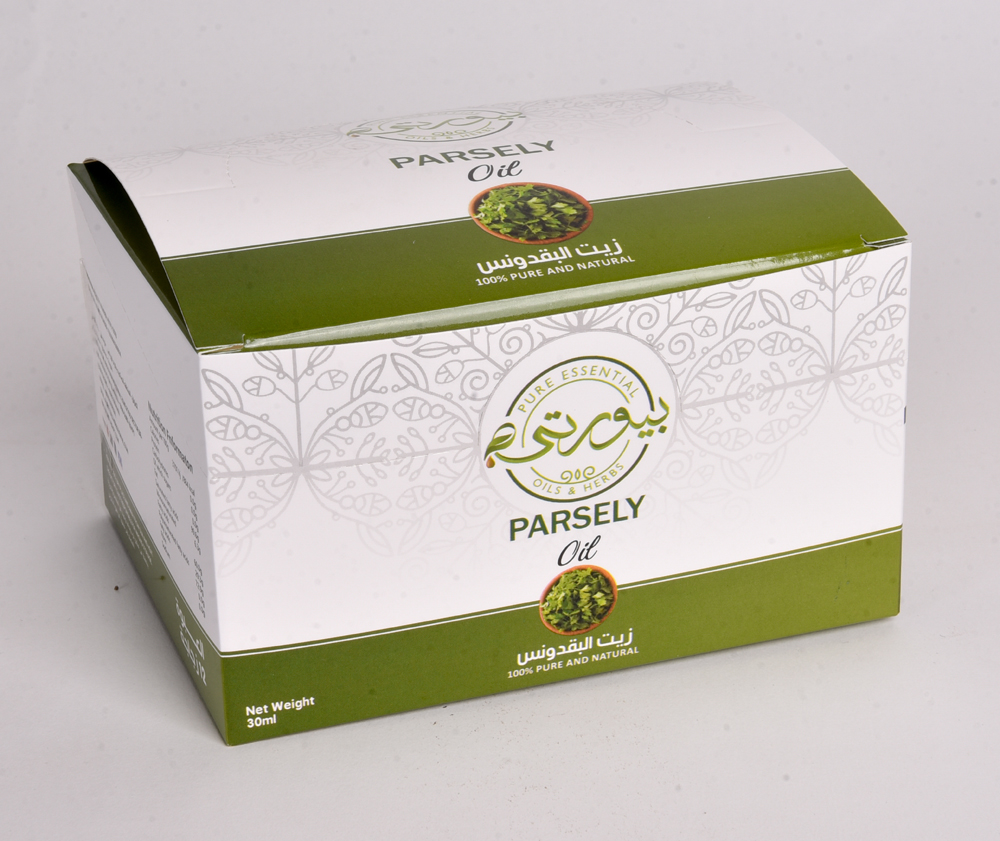Parsley Seeds Infused Oil Parsley seed or essential oil infused in Carrier Oil
Login to view prices
Over the years, parsley has been used to treat conditions like high blood pressure, allergies, and inflammatory diseases. Often labeled as one of the most powerful disease-fighting plants, parsley provides great nutritional value and offers many potential health benefits. Parsley is also a great source of vitamins A and C — important nutrients with antioxidant properties Additionally, it’s very low in calories yet packed with flavor, making it a great low-calorie ingredient for many recipes.
This Product for Consumer Retail packaging. if you are interested in Bulk Packaging to buy the oil as raw material, Please browse our Raw Materials
This product is infused oil in diluted form suitable for direct use not very concentrated like essential oil which can not be used directly. please read details below about what is infused oil?
Benefits and Uses of Parsley oil
Parsley is a flowering plant native to the Mediterranean. The two most common types are French curly-leaf and Italian flat-leaf.
Over the years, parsley has been used to treat conditions like high blood pressure, allergies, and inflammatory diseases
Today, it’s widely used as a fresh culinary herb or dried spice. It’s bright green in color and has a mild, bitter flavor that pairs well with many recipes.
Often labeled as one of the most powerful disease-fighting plants, parsley provides great nutritional value and offers many potential health benefits
- Contains many important nutrients
Parsley offers many more nutrients than people suspect.
A 1/2 cup (30 grams) of fresh, chopped parsley provides (3 ):
Calories: 11 calories
Carbs: 2 grams
Protein: 1 gram
Fat: less than 1 gram
Fiber: 1 gram
Vitamin A: 108% of the Reference Daily Intake (RDI)
Vitamin C: 53% of the RDI
Vitamin K: 547% of the RDI
Folate: 11% of the RDI
Potassium: 4% of the RDI
The herb is rich in many vitamins, particularly vitamin K, which is needed for blood clotting and bone health.
Parsley is also a great source of vitamins A and C — important nutrients with antioxidant properties
Additionally, it’s very low in calories yet packed with flavor, making it a great low-calorie ingredient for many recipes.
SUMMARY
Parsley is a low-calorie, nutrient-dense herb. It’s particularly rich in vitamins K, A, and C.
- Rich in antioxidants
Parsley contains many powerful antioxidants that can benefit your health.
Antioxidants are compounds that prevent cellular damage from molecules called free radicals. Your body requires a healthy balance of antioxidants and free radicals to maintain optimal health (6 ).
The main antioxidants in parsley are
flavonoids
carotenoids
vitamin C
The fragrant herb is particularly rich in a class of antioxidants known as flavonoids. The two main flavonoids include myricetin and apigenin.
Studies show that diets rich in flavonoids may lower your risk of conditions, including colon cancer, type 2 diabetes, and heart disease.
Furthermore, beta carotene and lutein are two antioxidants known as carotenoids. Many studies associate higher intake of carotenoids with a reduced risk of certain diseases, including lung cancer.
Vitamin C also has strong antioxidant effects and plays an important role in supporting immune health and protecting against chronic disease.
Interestingly, dried parsley may be higher in antioxidants than fresh sprigs. In fact, one study found that the dried herb had 17 times more antioxidant content than its fresh counterpart (7 ).
SUMMARY
Parsley contains many powerful antioxidants, which may help prevent cell damage and lower your risk of certain diseases.
- Supports bone health
Your bones need certain vitamins and minerals in varying amounts to remain healthy and strong.
Parsley is packed with vitamin K — an essential nutrient for bone health. A 1/2 cup (30 grams) provides an impressive 547% of the RDI
Vitamin K helps build stronger bones by supporting bone-building cells called osteoblasts. This vitamin also activates certain proteins that increase bone mineral density — a measure of the amount of minerals present in your bones
Bone density is important, as a lower bone mineral density is associated with an increased risk of fractures — especially in older adults.
Some studies suggest that eating foods high in vitamin K may reduce your risk of fractures. One study found that higher vitamin K intake was associated with a 22% lower risk of fractures.
Typical dietary intakes of vitamin K may be below the levels needed to improve bone mineral density and reduce fracture risk. Therefore, eating foods like parsley may benefit bone health.
SUMMARY
Parsley is rich in vitamin K, which is an essential nutrient for optimal bone health. Eating foods high in this nutrient has been linked to a reduced risk of fractures and improved bone mineral density.
- Contains cancer-fighting substances
Parsley contains plant compounds that may have anticancer effects.
Oxidative stress — a condition characterized by an imbalance in levels of antioxidants and free radicals — is associated with the development of certain chronic diseases, including cancer.
Parsley is particularly rich in flavonoid antioxidants and vitamin C, which reduce oxidative stress in your body and may lower your risk of certain cancers.
For example, high dietary intake of flavonoids may reduce colon cancer risk by up to a 30% .
Additionally, subgroups of certain flavonoids in parsley — such as myricetin and apigenin — have shown anticancer activity in test-tube and animal studies
Plus, eating foods rich in vitamin C may reduce your risk of cancer as well. A 1/2 cup (30 grams) of parsley provides 53% of the RDI for this nutrient.
One study found that increasing vitamin C by 100 mg per day reduced the risk of overall cancer by 7%. Moreover, increasing dietary vitamin C by 150 mg per day may lower prostate cancer risk by up to 21%
SUMMARY
Parsley contains various antioxidants — like flavonoids and vitamin C — that may provide cancer-fighting benefits.
- Rich in nutrients that protect your eyes
Lutein, beta carotene, and zeaxanthin are three carotenoids in parsley that help protect your eyes and promote healthy vision. Carotenoids are pigments found in plants that have powerful antioxidant activity.
Lutein and zeaxanthin may prevent age-related macular degeneration (AMD), an incurable eye disease and a leading cause of blindness around the world.
In fact, eating foods rich in lutein and zeaxanthin may reduce your risk of late AMD by up to 26% .
beta carotene is another carotenoid that supports eye health. This carotenoid can be converted into vitamin A in your body.
This conversion of beta carotene explains why parsley is very rich in vitamin A. A 1/2 cup (30 grams) of freshly chopped leaves provides 108% of the RDI for this vitamin.
Vitamin A is essential for eye health, as it helps protect the cornea — the outermost layer of your eye — as well as the conjunctiva — the thin membrane covering the front of your eye and the inside of your eyelids (32 ).
SUMMARY
Parsley contains lutein, zeaxanthin, and beta carotene, plant compounds that protect eye health and may reduce your risk of certain age-related eye conditions like AMD.
- May improve heart health
Parsley is a nutrient-dense herb that may improve heart health. For example, it’s a good source of the B vitamin folate — with 1/2 cup (30 grams) providing 11% of the RDI (3 ).
High intakes of dietary folate may reduce heart disease risk in certain populations. A large study in over 58,000 people found that the highest intake of folate was associated with a 38% reduced risk of heart disease (33 ).
Conversely, low intake of folate may increase your risk of heart disease. One study in 1,980 men observed a 55% increase in heart disease risk in those with the lowest intake of this nutrient.
Some experts hypothesize that folate benefits heart health by lowering levels of the amino acid homocysteine. High homocysteine levels have been linked to a higher risk of heart disease in some studies.
Homocysteine may negatively affect heart health by altering the structure and function of your arteries. However, the connection between this amino acid and heart disease still remains controversial.
SUMMARY
Parsley is rich in folate, a B vitamin that protects your heart and may reduce your risk of heart disease.
- Parsley extract has antibacterial properties
Parsley may have antibacterial benefits when used as an extract.
For example, a test-tube study demonstrated that the extract showed significant antibacterial activity against yeast, molds, and a common, infection-causing bacteria known as S. aureus .
The extract may also prevent the growth of bacteria in food. Another test-tube study found it prevented the growth of potentially harmful bacteria, such as Listeria and Salmonella — both known to cause food poisoning .
Though the extract shows antibacterial potential in test-tube studies, these benefits have not yet been studied in humans.
SUMMARY
Parsley extract has been shown to have antibacterial properties in test-tube studies. Still, more research is needed.
===============
What is Infused Oil?
An infused oil, also referred to as a macerated oil, consists of a carrier oil that has been permeated (“infused” or “macerated”) with one or more herbs or the essential oil of that herb. The benefit to using an infused oil as opposed to a plain carrier oil is that the infused oil will contain the properties of both the carrier oil and the herbs or essential oil and is suitable for direct use for consumer without lot of precautions like concentrated essential oils
Some plants do not have much essential oil contained in them, and in those cases, it is rare or impossible to commercially find an essential oil for that plant species. Infusing the herb into a carrier oil, however, can be a suitable way to still use the herb for aromatherapy purposes.
Infused oils generally have an oily feeling that varies depending on the carrier oil used. They also are not as concentrated as essential oils.
What are carrier oils?
Carrier oils and essential oils are made from plants. Carrier oils are used to dilute essential oils and “carry” them to your skin. That’s because essential oils are potent and can cause irritation when applied directly to your skin.
Most carrier oils are unscented or lightly scented and don’t interfere with an essential oil’s therapeutic properties. They may be used alone or with other oils to nourish your skin.
=========================
What examples of carrier oils we use to make our infused oils?
1. Coconut oil
Coconut oil is an edible oil made from the meat of mature coconuts. It’s available in refined or unrefined varieties. Unrefined coconut oil comes from fresh coconut meat. It’s not processed with chemicals and retains its coconut aroma and flavor. Refined coconut oil comes from dried coconut meat, also called copra. It’s bleached and deodorized to remove contaminants, as well as the distinct coconut aroma and flavor. Refined coconut isn’t all-natural and isn’t recommended for use as a carrier oil.
Uses: Coconut oil contains skin-nourishing fatty acids and polyphenols, which make it a great carrier oil for massage oils and skin care preparations.
2. Jojoba oil
Jojoba oil comes from the seeds of the jojoba plant. It has a delicate, nutty aroma. Technically, jojoba isn’t an oil, but a wax with powerful moisturizing properties. It’s thought to closely mimic sebum, the skin’s natural oil. Using jojoba oil may help reduce the skin’s oil production in acne-prone people by making the skin think it’s produced enough oil.
Uses: Jojoba oil absorbs easily in the skin and doesn’t clog pores. This makes it a good carrier oil option for massage oils, facial moisturizers, and bath oils.
3. Apricot kernel oil
Apricot kernel oil is made from apricot seeds, also known as kernels. It’s an emollient oil high in fatty acids and vitamin E. It absorbs easily into the skin and has a slightly sweet, nutty scent. You can buy edible apricot kernel oil, or apricot kernel oil for cosmetic use only.
Uses: Apricot kernel oil is thought to help soften and calm irritated, itchy skin. Use it as a carrier oil to make massage oils, bath oil, and hair care preparations.
4. Sweet almond oil
Sweet almond oil has a strong, nutty aroma. It’s an edible oil made from the kernels of sweet almonds. The oil is lightweight and absorbs easily, and is a great moisturizer for dry skin.
It’s also used in general aromatherapy, but its strong scent may mask an essential oil’s aroma.
Uses: Sweet almond oil is one of the most popular carrier oils for skin care. It’s great in massage oils, bath oils, and soaps.
5. Olive oil
Olive oil comes from pressed olives. It’s best known as a healthy, edible oil with a fruity aroma, but it’s also used in aromatherapy as a carrier oil.
Extra-virgin olive oil is the preferred variety for aromatherapy and skin care preparations. Olive oil’s scent may interfere with the scent of some essential oils.
Uses: It’s packed with fatty acids and plant sterols, which make it great for cleansing and moisturizing dry skin. Use olive oil as a carrier oil for massage, facial cleansers, hair care, and homemade soaps.
6. Argan oil
Argan oil is made from kernels found inside the fruit of argan trees, which are native to Morocco. The oil is edible and is traditionally used to nourish the body inside and out. It has a nutty aroma and is rich in vitamins A and E, and monounsaturated fatty acids.
Uses: Argan oil can help treat dry skin and hair, wrinkles, and skin inflammation. This makes it a terrific carrier oil for general skin care and massage oils.
7. Black seed oil
Black seed oil is made from the Nigella sativa plant. Although it’s lesser known than other carrier oils, it’s richTrusted Source with unsaturated and saturated fatty acids. It’s also thought to have anti-inflammatory abilities.
Uses: Black seed oil is often used as a folk remedy to soothe skin conditions including eczema, acne, and psoriasis. With this in mind, it’s a great choice for facial care, massage oils, and general skin care.
=================================================
Quotation:
· Quantity: There minimum order per each packaging type. kindly contact us to know more details and discuss the best options for you
· Specification: 100% natural and Pure quality Organic or Conventional
· Documentation: COA, MSDS, TDS,.. Kindly see more information tab in the product page to see all documents available
· Payment terms: TT in advance to Our bank account
· Lead time: Shipping through 10 days from receipt of the payment.
· Sea Shipping Time: 35 days
· Air shipping time: 10 days
Branding Services
We also can do customized packaging for you to bottle whatever size you like. We can help in designing labels, selecting good bottles, and packaging. We deliver integrated solutions under your brand..
Additional information
| Weight | N/A |
|---|---|
| Dimensions | N/A |
| Oil Purity | This is infused Oil. Plant, Flowers, Essential oil infused in natural Carrier oil |
| Country of Origin | Egypt |
| Ship from | Egypt |
| Cultivation Type | Organic, Conventional |
| Oil Retail Packaging | Size 15 ml , Pack has 12 bottles. Carton has 8 Packs = 96 bottles/carton, Size 30 ml , Pack has 12 bottles. Carton has 8 Packs = 96 bottles/carton, Size 60 ml , Pack has 12 bottles. Carton has 8 Packs = 96 bottles/carton, Size 125 ml , Pack has 6 bottles. Carton has 5 Packs = 30 bottles/carton, Size 250 ml , Pack has 6 bottles. Carton has 4 Packs = 24 bottles/carton, Size 500 ml , Pack has 4 bottles. Carton has 4 Packs = 16 bottles/carton, Size 1000 ml , Pack has 4 bottles. Carton has 2 Packs = 8 bottles/carton |
| HS Code | 33012990 |
| CAS-Code | 8000-68-8 |
| Oil Documentation Available | Allergen Free Certificate, Bovine Spongiform Encephalophathy (BSE) Certificate, Certificate of Analysis (COA), GMO Certificate, GRAS Status Statement, Halal Certificate, Herbal Origin Statement, KOSHER Certificate, Manufacturing Flow Chart, Material Safety Data Sheet (MSDS), Organic Certificate, Pesticide Residual Certificate, Researches & Studies, Technical Data Sheet (TDS), WADA Prohibited list Statement |
| Custom Branding & Packaging | Yes, OEM Custom banding, designing and packaging are available for that product |
| Bulk Packaging Availability | Yes we can provide you the product in Bulk Packaging |
-
Login to view prices
-
Login to view prices
-
Login to view prices
Cilantro Herb Infused Oil Cilantro Herb or essential oil infused in Carrier Oil
Login to view prices Read more -
Login to view prices

















